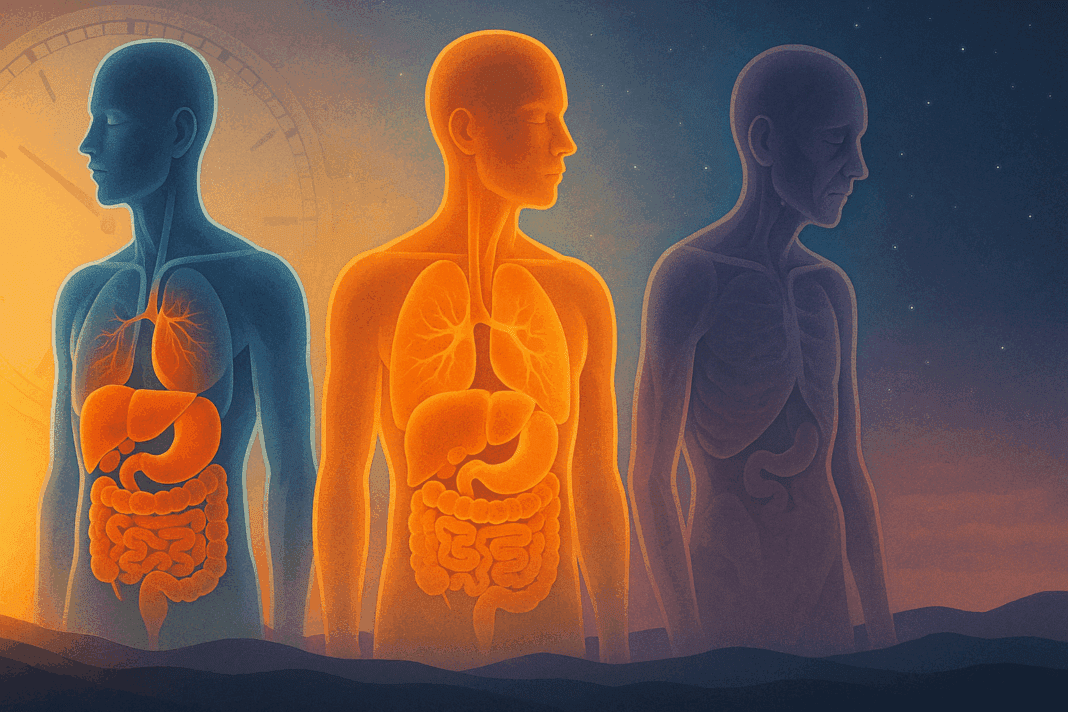The idea of not eating for a week may sound extreme to some and a weight-loss shortcut to others, but it is a subject that demands careful, science-backed discussion. Fasting, particularly extended fasting, has been practiced for centuries in both religious and therapeutic contexts. However, as modern wellness trends increasingly adopt versions of intermittent or prolonged fasting, many individuals are left asking important questions: what really happens to the body when we stop eating? Will I lose weight if I stop eating? How many days of not eating until I lose weight? These questions touch on the complex interplay between metabolism, fat storage, energy expenditure, and the body’s mechanisms for self-preservation. In this article, we will explore what the latest research tells us about not eating for a week, including the physiological changes that occur, the potential health risks and benefits, and the realities behind popular keyword searches such as “14 days stopped eating” or “not eating for 2 days.”
You may also like: Expert-Backed Weight Loss Tips for a Healthier Lifestyle: What You Need to Know for Long-Term Weight Control and Wellness
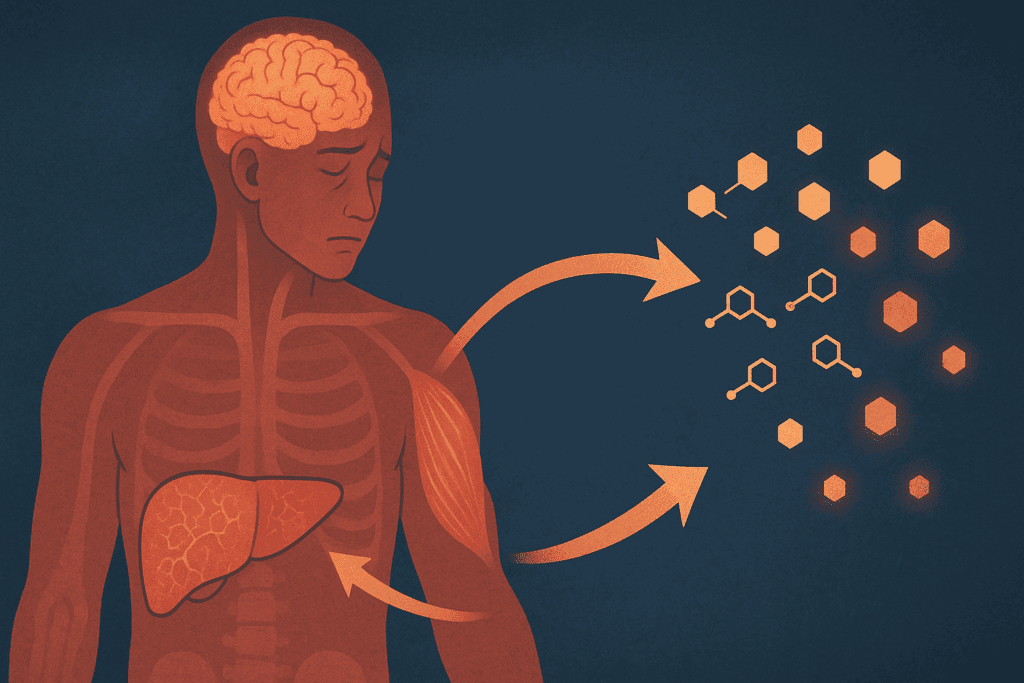
Understanding the First 24 to 48 Hours of Not Eating
The human body is remarkably adaptive when food becomes temporarily unavailable. Within the first 24 hours of not eating, the body shifts from relying on glucose from food to utilizing glycogen stored in the liver and muscles. This supply, however, is limited and typically lasts only about 24 to 36 hours. During this time, blood glucose levels begin to stabilize as insulin secretion decreases and glucagon increases, encouraging the breakdown of glycogen into glucose.
By the second day, as glycogen stores become depleted, the body enters a metabolic phase known as gluconeogenesis. This process involves the liver converting non-carbohydrate substrates like lactate, amino acids, and glycerol into glucose. However, the brain—which alone consumes approximately 20% of the body’s energy—requires a more sustainable source of fuel. This is where ketogenesis begins to play a key role. The liver begins converting fatty acids into ketone bodies, which become an alternative energy source for the brain and other organs. During these early days, those experiencing not eating for 2 days often report mental fog, fatigue, and increased irritability as their bodies transition into this new metabolic state.
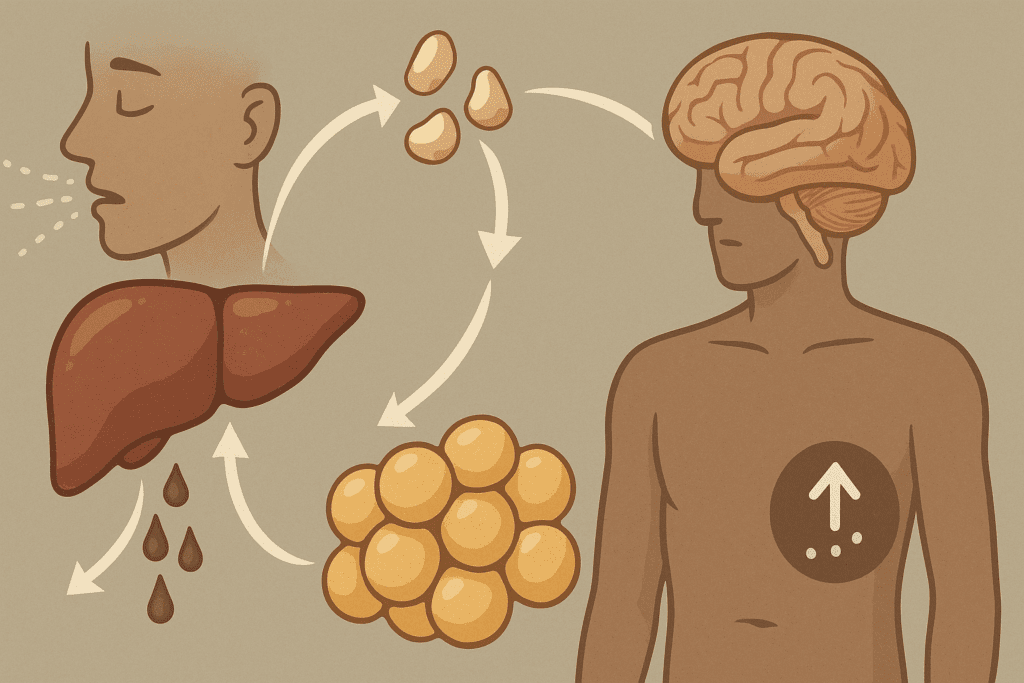
Ketosis and Metabolic Adaptation in the First Week
As the body continues to fast beyond 48 hours, deeper metabolic changes emerge. By the third day, ketone levels in the blood rise significantly, marking a full transition into a state of ketosis. At this point, energy demands are largely met through the oxidation of fat stores. Individuals often notice a decrease in appetite, attributed to the appetite-suppressing effects of ketone bodies such as beta-hydroxybutyrate.
Not eating for a week pushes the body further into survival mode. Basal metabolic rate (BMR) may begin to decline slightly as the body attempts to conserve energy, though this decline is not as significant as once believed. Lean mass is preserved to an extent by the hormonal changes that accompany fasting, such as increases in human growth hormone (HGH). However, prolonged fasting beyond a few days can still lead to muscle catabolism, particularly in the absence of physical activity.
At this stage, many people considering extreme fasting begin asking, “How many days of not eating until I lose weight?” The answer varies based on baseline body composition, hydration status, and total energy expenditure. Most people will begin losing weight within the first couple of days due to the loss of water weight from glycogen depletion. Fat loss generally follows after this, though the rate depends on numerous factors, including whether any caloric intake or electrolyte supplementation is involved during the fast.
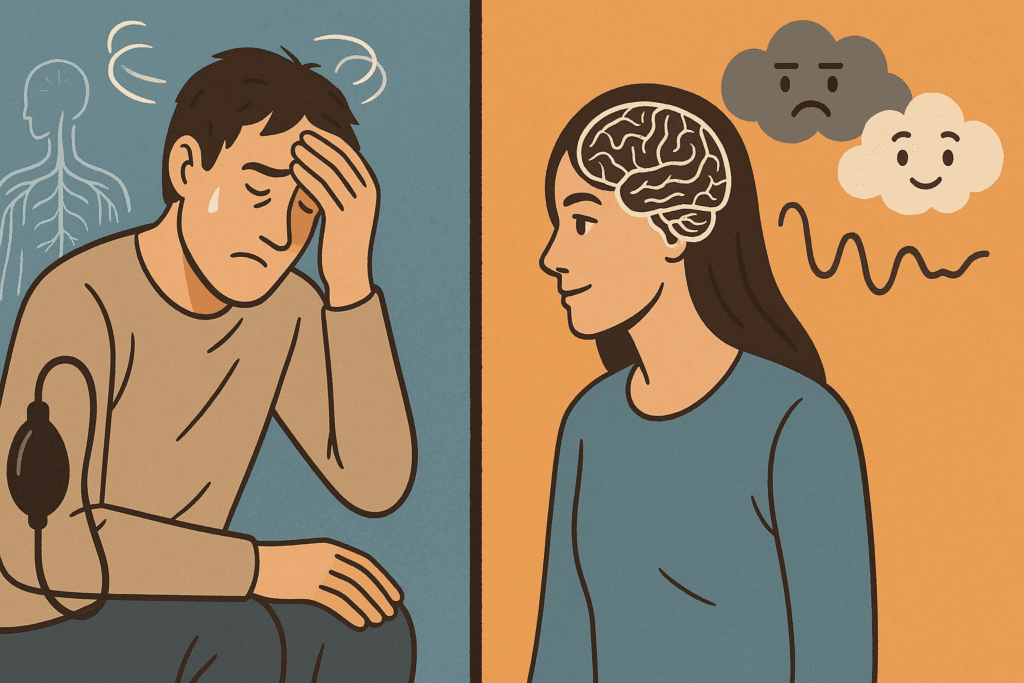
Physical and Psychological Effects of Not Eating for a Week
The physical effects of not eating for a week are multifaceted. On the surface, there is often noticeable weight loss, which can range from 5 to 10 pounds or more depending on body size and activity level. However, this weight loss includes both water and fat mass, and in some cases, lean tissue as well. As fasting continues, individuals may experience dizziness, cold sensitivity, low blood pressure, and fatigue due to lower glucose availability and electrolyte imbalances.
Psychologically, the experience varies significantly. Some report enhanced mental clarity and improved focus once the body adapts to ketosis, while others struggle with mood swings, depression, or anxiety. The body’s stress response is heightened during prolonged fasts, marked by increased cortisol levels. For individuals exploring the effects of 10 days stopped eating or more, the psychological toll can be considerable, especially when combined with social isolation or lack of medical guidance.
It is crucial to emphasize that while the body is biologically equipped to survive short-term fasting, extended fasting should never be undertaken without medical supervision. The risks associated with electrolyte depletion, vitamin deficiencies, cardiac arrhythmias, and other complications increase dramatically the longer one goes without food. This is especially true in searches like “14 days stopped eating” or “13 days stopped eating,” where misinformation online may lead individuals to dangerous experimentation.
Will I Lose Weight If I Stop Eating?
One of the most frequently asked questions in the realm of fasting and weight loss is: will I lose weight if I stop eating? The short answer is yes—but with important caveats. Weight loss will occur because the body must tap into stored energy reserves to meet its daily needs. However, this form of weight loss is not necessarily sustainable or healthy. The initial weight loss is largely water weight, followed by fat, and eventually muscle if the fast is prolonged. Without a plan for refeeding and lifestyle changes, much of the lost weight may return quickly.
Furthermore, the hormonal changes that occur during fasting can make long-term weight maintenance difficult. As leptin levels drop and ghrelin levels rise, appetite can surge after a fast, leading to rebound eating. Individuals often overcompensate during refeeding, not only reversing their progress but potentially exacerbating metabolic dysfunction. While stopping eating may seem like a shortcut, it rarely leads to lasting, healthy weight reduction.
How Many Days of Not Eating Until I Lose Weight?
This question, often posed by those considering extreme fasting, has a highly individualized answer. For most people, weight loss becomes visible within two to three days of not eating, particularly because the body uses up glycogen stores and loses associated water. As the fast continues, fat loss becomes more prominent, especially during a period of five to seven days.
However, it is misleading to think of fasting in strict numerical terms. The physiological impact of not eating for a week versus not eating for 2 days can differ dramatically between individuals based on gender, activity level, age, and overall metabolic health. People searching for guidance on 10 days stopped eating or 13 days stopped eating often find themselves navigating conflicting advice online. It is essential to prioritize safety and evidence-based practice over anecdotal accounts or viral fasting challenges.
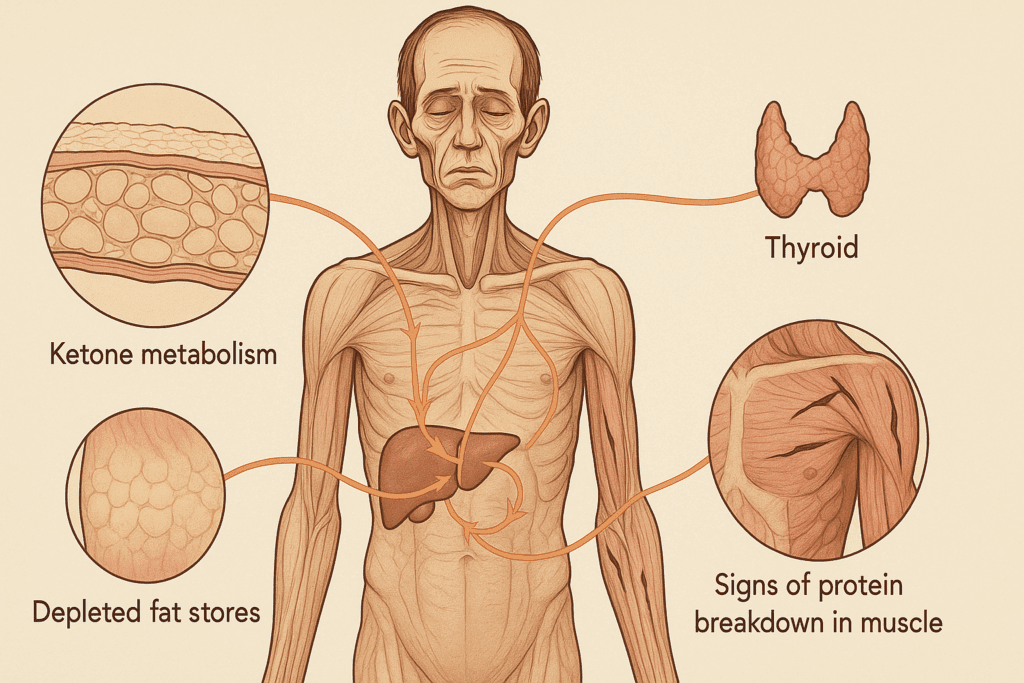
Examining the Physiology Behind 14 Days Stopped Eating
By the time the body reaches 14 days stopped eating, it is in an advanced state of metabolic adaptation. At this point, the body is relying almost exclusively on ketones and fat for energy, with gluconeogenesis continuing to supply minimal glucose to the red blood cells and parts of the brain. Hormones like insulin are at their lowest levels, and cortisol levels may be elevated, contributing to increased protein catabolism if energy needs exceed available fat stores.
In addition to profound weight loss, other changes include suppressed thyroid function, decreased libido, weakened immune function, and a drop in body temperature. These adaptations are part of the body’s broader effort to conserve energy and preserve life in a state of starvation. While some individuals report spiritual or cognitive breakthroughs during extended fasts, the risks of cardiac arrhythmias, dehydration, and sudden refeeding syndrome cannot be overstated. Prolonged fasting beyond 10 days should be medically supervised under all circumstances.
What Does It Say When You Stop Eating? Interpreting the Signals from Your Body
The human body communicates in subtle but meaningful ways when faced with a lack of food. What does it say when you stop eating? Initially, it signals hunger through the release of ghrelin, but if fasting continues, those hunger signals begin to fade. This is not a sign of adaptation in the sense of improved well-being, but rather a biological recalibration. The body is shifting its energy priorities and conserving resources, signaling a deeper stress response.
Physiological indicators such as dry skin, fatigue, and mental sluggishness are not merely inconveniences; they are warning signs that nutritional needs are not being met. During fasts such as those involving 10 days stopped eating, individuals may feel they have adapted due to reduced hunger, but this belies the significant internal toll being taken. Listening to these signals is essential. Ignoring them for the sake of rapid weight loss may result in long-term harm, particularly to cardiovascular, renal, and neurological systems.
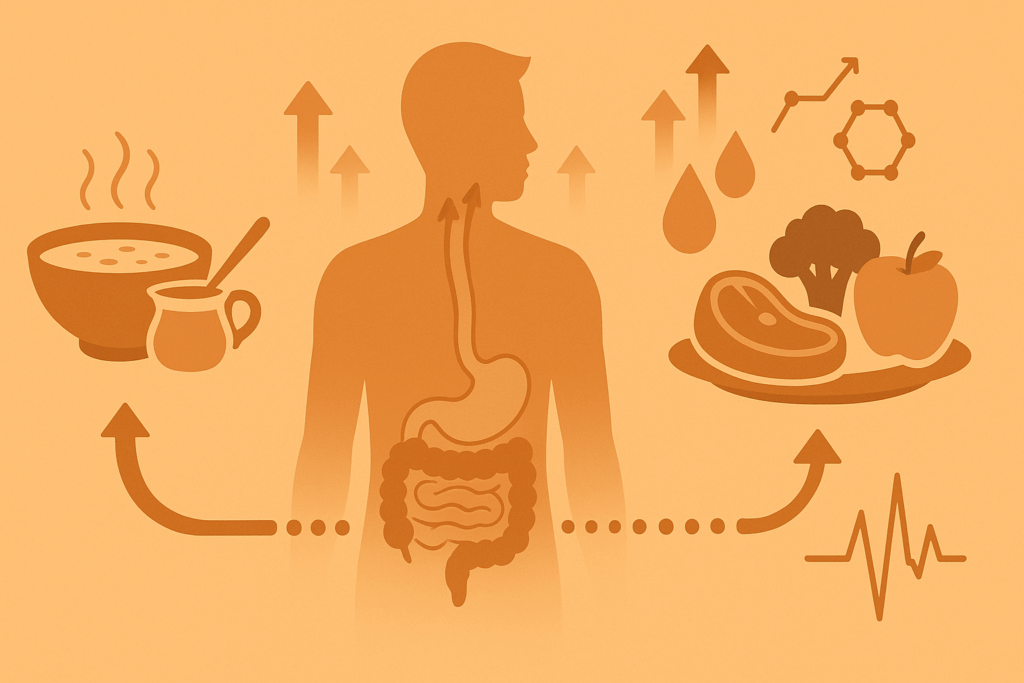
Refeeding After Not Eating for a Week: Risks and Recommendations
Ending a fast, especially one lasting several days, is a critical phase that must be handled with care. The transition back to eating, known as refeeding, carries its own set of risks. When the body has been deprived of food for an extended period, the sudden reintroduction of carbohydrates and nutrients can trigger refeeding syndrome—a potentially fatal shift in fluids and electrolytes, especially phosphate, potassium, and magnesium.
To reintroduce food safely, it is recommended to begin with small, frequent meals rich in easily digestible nutrients and low in carbohydrates. Bone broths, diluted vegetable soups, and steamed vegetables can serve as ideal starters. As the digestive system slowly reawakens, more complex foods can be introduced, but only under guidance if the fast has lasted longer than five days. For those emerging from protocols like 14 days stopped eating or 13 days stopped eating, supervised medical monitoring is strongly advised.

The Psychology of Fasting and the Illusion of Control
One of the more overlooked aspects of extended fasting is the psychological dimension. For some individuals, fasting can become a coping mechanism or a form of control during periods of emotional distress. It may start with a genuine desire to lose weight, but the process of not eating for a week or more can evolve into disordered patterns akin to anorexia nervosa or orthorexia. The clarity or euphoria sometimes experienced during ketosis can reinforce these behaviors, masking the underlying psychological risks.
It is important to differentiate therapeutic fasting from pathological restriction. While some medically supervised fasting programs have shown benefits in clinical trials for conditions like type 2 diabetes or epilepsy, they differ fundamentally from unsupervised fasting undertaken for aesthetic goals. For those struggling with the urge to continue fasting beyond what is safe, psychological support and counseling may be essential to prevent long-term harm.
Frequently Asked Questions: Not Eating and Weight Loss
1. Can not eating for a week affect your gut microbiome long-term? Yes, not eating for a week can significantly influence the diversity and composition of your gut microbiome. The absence of dietary fiber and prebiotic compounds deprives beneficial bacteria of the fuel they need, potentially leading to a reduction in microbial diversity. This may result in a temporary increase in pro-inflammatory species or a weakened gut barrier. While the microbiome can often rebound once regular eating resumes, repeated or extended fasting—such as 10 days stopped eating or longer—may delay full recovery or alter gut function in subtle ways. This microbial disruption may affect digestion, immunity, and even mood long after eating resumes.
2. Will I lose weight if I stop eating, even if I have a slow metabolism? Even individuals with slower metabolisms will lose weight if they stop eating, because the body will still need to meet its energy requirements through internal reserves. However, the rate of weight loss may differ, as a slower metabolism conserves energy more effectively. During not eating for a week, those with lower metabolic rates may retain more lean mass initially but experience a sharper metabolic slowdown later. This can make post-fast weight regain more likely unless refeeding is carefully managed. In this context, weight loss is not just about the number of calories burned but about how the body adapts hormonally and metabolically to the absence of food.
3. What are the psychological effects of not eating for 2 days versus 14 days? Not eating for 2 days can produce mild irritability, fatigue, or restlessness, often associated with early-stage hunger cues and stress hormone activation. However, by the time someone reaches 14 days stopped eating, the psychological effects can become far more complex. Some individuals report an emotional blunting or euphoria due to elevated ketone levels and reduced serotonin synthesis, which can dangerously mask the body’s distress. Extended fasts like 13 days stopped eating may also induce obsessive thoughts about food or body image, particularly in those predisposed to disordered eating. The longer the fast, the more critical it is to consider mental health alongside physiological outcomes.
4. How does physical activity influence weight loss during fasting? Engaging in light to moderate physical activity during fasting can accelerate fat oxidation and improve metabolic flexibility. However, high-intensity training while not eating for a week may increase the risk of muscle breakdown and electrolyte imbalance. For those contemplating 10 days stopped eating, incorporating gentle movement such as yoga or walking is safer than resistance training or cardio-intensive routines. Physical activity during fasting also improves insulin sensitivity and may blunt the post-fast glucose spike during refeeding. Ultimately, movement should support recovery, not compromise energy conservation.
5. What does it say when you stop eating and stop feeling hungry? The loss of hunger after prolonged fasting can be misleading. What does it say when you stop eating and your appetite disappears? It often signals that the body has transitioned to survival mode, relying heavily on ketones for brain function. While this appetite suppression may feel like control, it’s actually a physiological sign that the body is conserving resources. In cases such as 13 days stopped eating, this loss of hunger can make fasting psychologically addictive and reduce awareness of potentially dangerous health risks. Recognizing this change is essential for making informed, medically safe decisions.
6. Is there a difference between not eating for a week with water and without? Yes, there is a profound difference. Not eating for a week while consuming adequate water and electrolytes can be survivable for many healthy individuals, though still medically risky. In contrast, a dry fast—where both food and water are withheld—can lead to dehydration, acute kidney injury, and even death within a few days. Whether you’re considering not eating for 2 days or 14 days stopped eating, hydration is non-negotiable. Proper fluid intake supports organ function, thermoregulation, and detoxification processes during fasting. Always prioritize hydration as a first principle of any extended fast.
7. How many days of not eating until I lose weight from fat rather than water? During the first 24 to 48 hours, most of the weight lost is water associated with glycogen depletion. For many, it’s around the third or fourth day that significant fat oxidation begins to contribute to weight loss. If someone is not eating for a week, the latter half of that period will increasingly rely on body fat for energy. That said, how many days of not eating until I lose weight from fat also depends on baseline body composition, metabolic rate, and physical activity. Individuals with more stored fat may transition to fat-burning more efficiently than those with lower reserves.
8. Are there any long-term metabolic consequences of not eating for a week? Repeated cycles of fasting, particularly not eating for a week or longer, can disrupt thyroid function, suppress reproductive hormones, and slow basal metabolic rate over time. While occasional fasting may improve insulin sensitivity or support autophagy, chronic or extreme restriction—such as 14 days stopped eating without proper refeeding—can lead to hypothalamic dysfunction. This may manifest as persistent fatigue, cold intolerance, irregular periods, or reduced libido. These long-term changes highlight the importance of balance and underscore that short-term weight loss should not compromise long-term metabolic health. Medical guidance is essential before considering prolonged fasts.
9. How do social dynamics impact people attempting extended fasts? Social environments can have a profound effect on fasting experiences. People who are not eating for 2 days or longer may find themselves socially isolated due to the inability to participate in meals or dining rituals. This detachment can exacerbate feelings of loneliness or cause friction with loved ones who are concerned. Moreover, extended fasts such as 10 days stopped eating may attract attention online, sometimes glamorizing dangerous behavior through social media. It’s important to build a supportive network and avoid environments that normalize extreme dietary practices without scientific backing. Community and context play a major role in health outcomes during fasting.
10. Can fasting for 14 days cause nutrient deficiencies that persist even after refeeding? Yes, nutrient deficiencies incurred during a 14 days stopped eating protocol can persist well beyond the fast itself, especially if refeeding is poorly managed. Micronutrients such as magnesium, thiamine, and potassium are rapidly depleted during prolonged fasts and may take weeks or months to replenish fully. Furthermore, low stomach acid following extended fasting can impair nutrient absorption, compounding the problem. People recovering from 13 days stopped eating or longer should consider comprehensive bloodwork and targeted supplementation. A long-term recovery strategy should include not just calories, but also micronutrient repletion and digestive support.
Final Thoughts on Not Eating for a Week and the Reality of Weight Loss
Fasting remains a topic of intrigue, often straddling the line between ancient wisdom and modern controversy. Not eating for a week does, undeniably, initiate significant physiological changes, many of which lead to rapid weight loss. However, the answer to the question “Will I lose weight if I stop eating?” is not as straightforward as the number on the scale might suggest. True health is measured not just by body mass but by resilience, hormonal balance, and metabolic flexibility.
While curiosity around keyword searches like how many days of not eating until I lose weight or 10 days stopped eating is understandable, it is vital that these explorations are grounded in medical reality. The body is capable of surviving extended fasts, but survival is not the same as thriving. Before undertaking any prolonged period of not eating, individuals should consult with healthcare professionals and consider the long-term implications for both physical and mental health. Sustainable wellness comes from balance, not extremes—and from respecting the body’s remarkable, but not infinite, adaptability.
Further Reading:
Can you lose weight by not eating?
How Long Can You Live Without Food?
Intermittent fasting: Benefits, how it works, and is it right for you?


